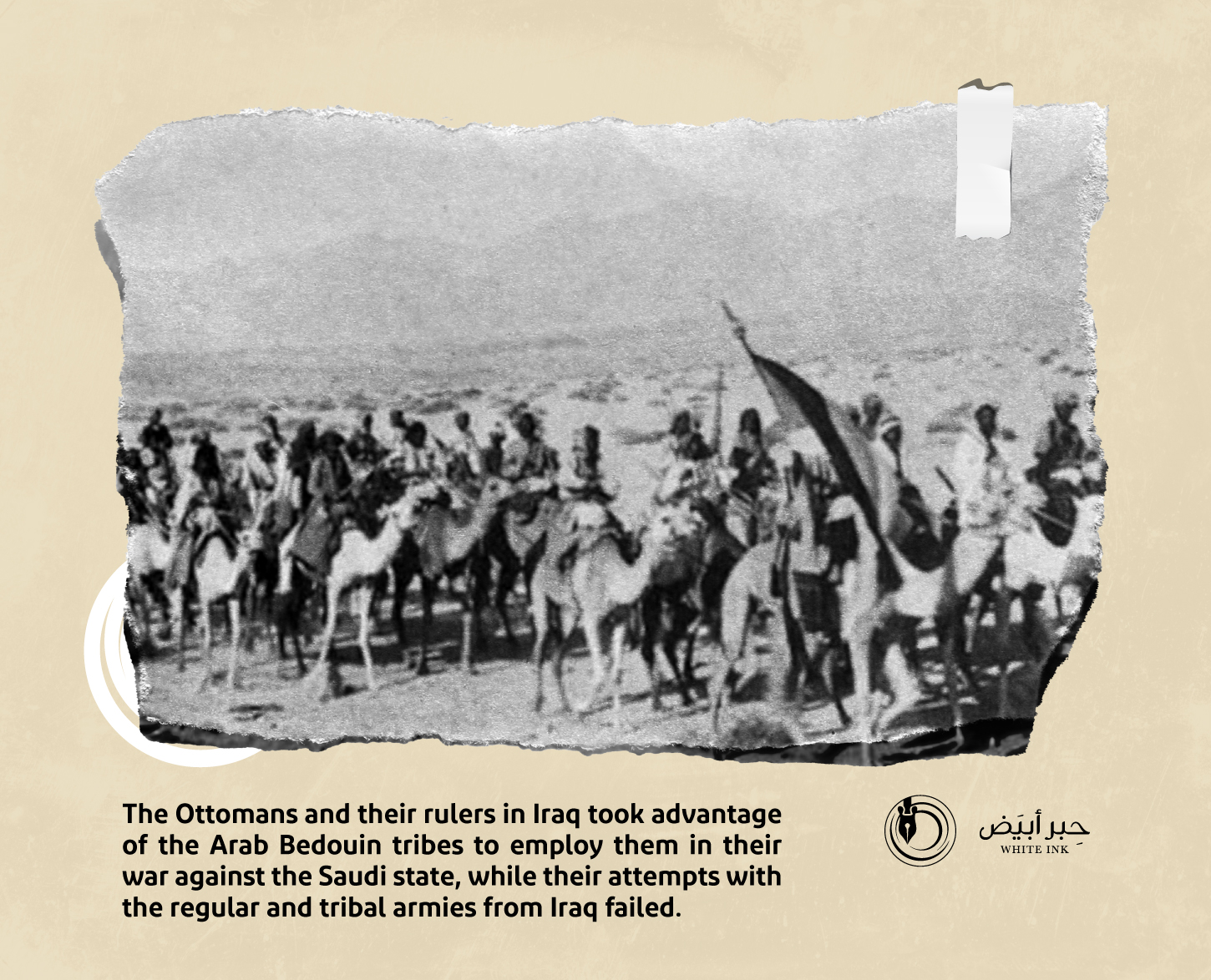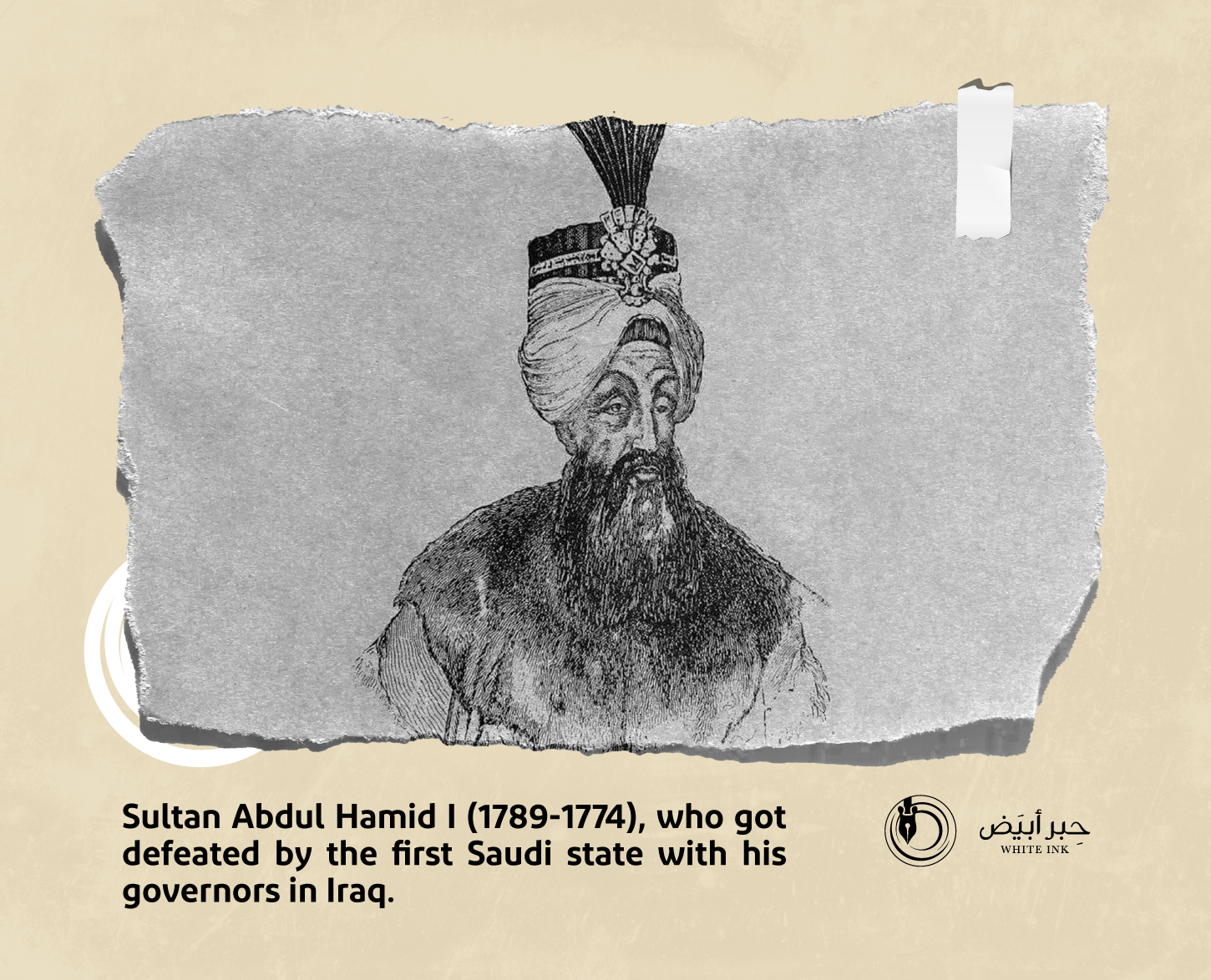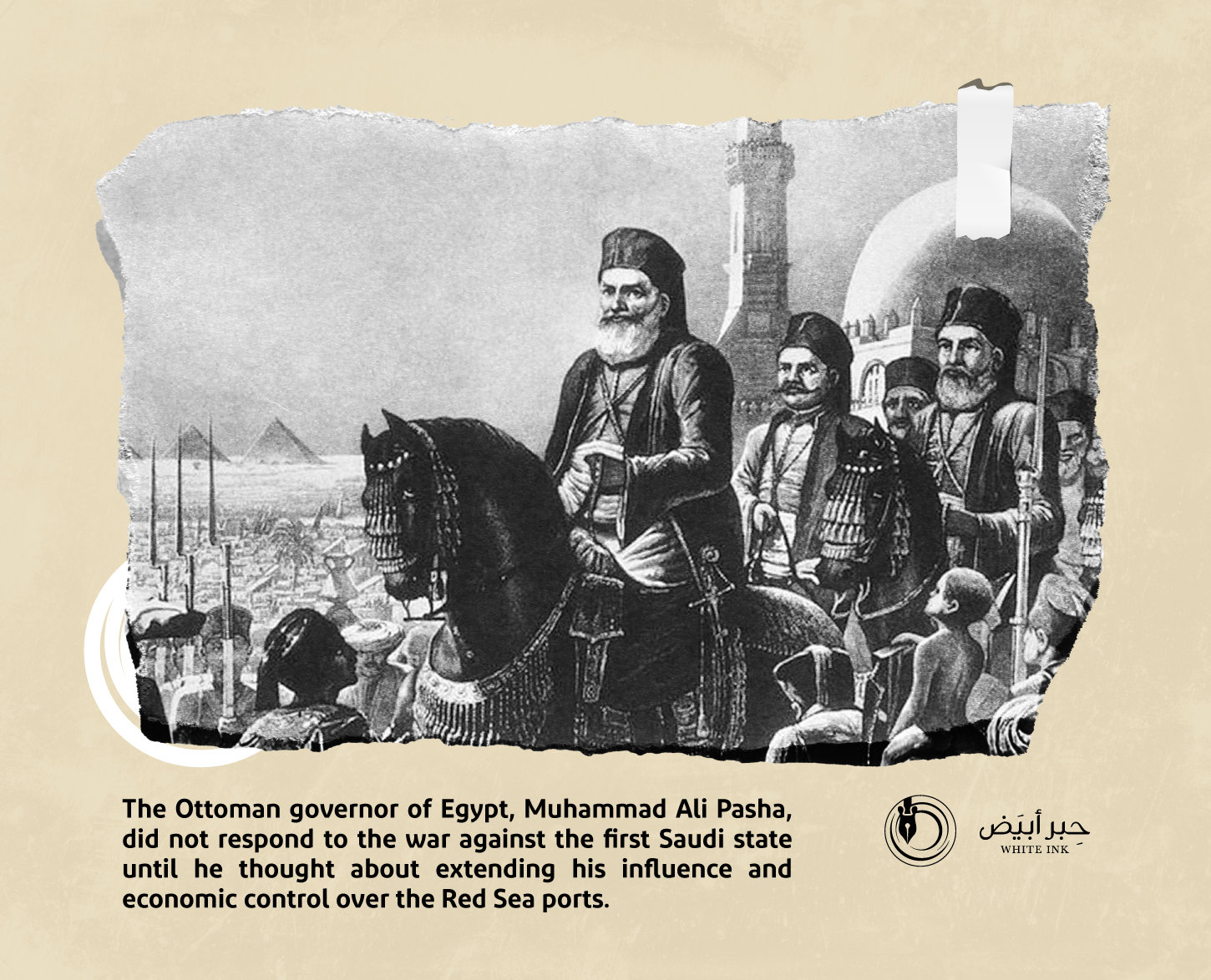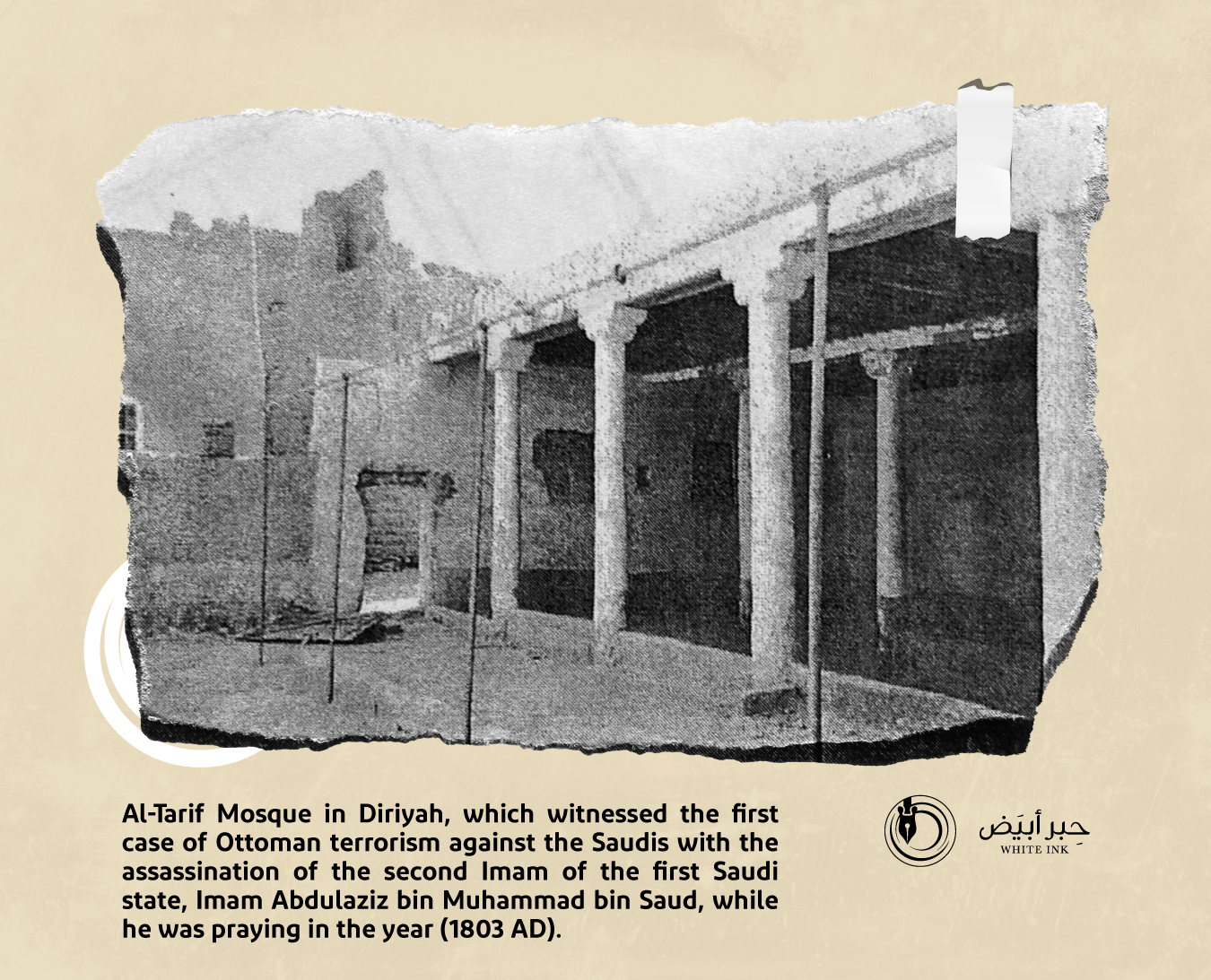
A history lesson…. Ottoman Sultans never learned
Saudi established Home within their hearts prior to political boundaries
It never crossed the Ottoman sultans’ minds that there would be men from the deserts of the Arabian Peninsula, who believe heartfully in their Arab and Islamic homeland, and those men sought its independence from the grip of the Turks who were a burden on their chests, thus bequeathing them poverty and backwardness for centuries, at a time when the power of the Ottoman family was concentrated in the Arab regions full of fortunes, such as Iraq, the Levant and Egypt, as for the Arabian Peninsula, they neglected it for decades and left it to unknown rulers who were extremely injustice against its people and left them vulnerable.
The Ottoman sultans conducted a superior policy towards the Arabian Peninsula, especially Najd and Hijaz; with the establishment of the first Saudi state in Diriyah led by Imam Muhammad bin Saud in (1744) and carrying the banner of reform and renaissance, the Ottomans felt that what was happening was not just an internal tribal movement, but a state under establishment that brings with it, a political renaissance and intellectual reform.
Nevertheless, the Ottomans initially underestimated the first Saudi state, and they assumed that any internal political force with a few weapons and support could eliminate it. However, history has proven the mistake in their presumption and evaluation, as the armies of the first Saudi state were able to repel the Turkish aggression repeated by several forces by proxy, until the Saudi state was able to unite vast lands of the Arabian Peninsula, which made the Turks keen to maintain their influence there.
The Turkish sultans felt threatened because they realized that Imam Muhammad bin Saud holds a project of a reformist state.

The first Saudi state directly clashed with the Ottoman Empire in Iraq, the authentic Arab region that has direct borders with the Arabian Peninsula; the Saudis did not consider Mesopotamia to be anything but an Arab region under Ottoman occupation such as Hijaz, and that was the Saudi dream, liberating this region from the Turkish occupation.
having Imam Abdul Aziz bin Muhammad bin Saud assumed the first Saudi state following the death of his father, the founding Imam (may God have mercy on his soul) in (1765); he resumed establishing the state and extended his internal influence until he entirely unified Najd, and was able to unify eastern Arabian island.
Saleh Al-Shura says in his book, “The position of Ottoman Iraq from the first Saudi state: The Ottomans’ attitude towards the Saudi state was variable by changing circumstances and the messages it received.” At first, it refused to pay attention to what was happening in the center of the island; however, with the sustained Saudi progress, Astana found itself fighting one battle after another against a young state in Diriyah without achieving a significant victory over it.
The Ottomans’ crisis escalated with the establishment of the first Saudi state and reaching its peak, after the Saudis recaptured Al-Ahsa; despite the fact that it was not under the Ottomans control, the matter seemed terrifying to the Turks. With the arrival of the Saudis to the ports of the Arabian Gulf, this matter provoked their opponents, especially in Iraq, and soon began to incite the tribes and the desert against the Saudi state. This prompted the Saudis to launch quick military campaigns in southern Iraq, in response to what the Ottoman governors were doing, inciting against the followers of the state and attacking them and raiding their convoys passing through their lands.
The Ottomans were convinced that tribal harassment and large non-military operations would not affect the Saudis, so they decided to launch organized campaigns, starting with the campaign of the leader of Al-Muntafiq in Iraq, Thuwaini bin Abdullah, which was directed to the capital of the first Saudi state, Diriyah, and reached one of the most significant Saudi regions (Qassim) in ( 1786), but Saudi valor thwarted the Ottoman campaign and was defeated, which made the Saudis consider that the matter will not stop there, and that they are being targeted by the Ottomans through the governors and leaders of Iraq.
After the Ottoman Selim III ascended the throne of the Sultanate in (1798-1807), the Saudi state was the most stressful file for him in the Arabian Peninsula, as despite his attempts and the attempts of those before him to end it through the governors of Iraq, it was unfeasible and unsuccessful for them, especially in light of the slowdown and the reluctance of the governors of Iraq, which was countered by the Saudi belief in unity and the legitimate right to have a homeland against the occupation. The Ottoman failure in front of the Saudi power was accumulating with every confrontation that took place between the two parties.
Historical narratives confirm that three of the occupied Arab states of the Ottomans either participated in or were ordered to eliminate the first Saudi state: Iraq, the Levant, whose governor refused to get involved in fighting the Saudis for fear of provoking them and consequently, their expansion in the Levant, and Egypt through their ruler Muhammad Ali Pasha. The latter, in turn, sent his two sons, Tosun and Ibrahim Pasha, eventually he had to go in person, to lead the campaigns. For this reason, the first Saudi state was a source of concern that insulted the Ottoman Sultanate and its sultan, despite the strength, capabilities, and imperial thought that had hundreds of years in front of an emerging power compared to their colonial state. The Ottomans could not eliminate the source of their anxiety in the Arabian Peninsula until after they decided to use everything, they got to reach Diriyah, the capital of the Saudi state, and besieged, bombed and negotiated the killing of women and children, which prompted its last imam, Abdullah bin Saud, to surrender and leave in order to preserve the safety of the people, who had been betrayed by the Ottomans.
The Ottomans were convinced that they had no desire to engage in an outright war with the first Saudi state; therefore, they resorted to terrorism, betrayal and treachery, believing that they could break the Saudis, who had built a homeland within their hearts, before they set political borders.
The Ottomans failed before the Saudis in Al-Ahsa through their governors in Iraq and their military leaders there, and the victories of Imam Saud bin Abdulaziz over them, and the humiliated request from Kikhia Ali for peace with the Saudis, proves that the Saudis dealt nobly even with their enemies, while the Ottomans dealt with treachery and betrayal, as soon as they reconciled the Saudis in Al-Ahsa, they moved from other sides to achieve their goal of eliminating the Saudis.
It was one of the first forms of Ottoman treachery against the first Saudi state; that the first case of assassination took place in Diriyah against the Saudis; was the assassination of Imam Abdulaziz bin Muhammad bin Saud (may God have mercy on his soul) in 1803, while he was praying in Al-Tarif Mosque in Diriyah by an envoy from Iraq after the Ottoman failure in Al-Ahsa, with the aim of spreading horror and terror among the Saudis, in retaliation for the insult suffered by the Ottomans from the Saudi army.
The first Ottoman terrorism operation against the Saudis was the assassination of Imam Abdul Aziz while he was praying in Al-Tarif Mosque in Diriyah in (1803).



- Hussein bin Ghannam, Kindergarten ideas and understandings of the Imam and walked through the event of census invasions with Islam (Riyadh: Dar Al-Tholothia, 2010).
- Ottoman bin Bishr, Title of glory in the history of Najd, achieved by: Abdul Rahman Al Sheikh, 4th ed (Riyadh: Ministry of Education, 1971).
- Abbas Al-Azzawi, The History of Iraq between Two Occupations (Baghdad: Baghdad Press, 1935).
- Abd al-Rahim Abd al-Rahman, The First Saudi State, 5th ed (Cairo: University book house, 1987).
- Muhammad Al-Khudairi, The First Saudi State and the Ottoman Empire (Riyadh: Sawlatia for Education, 2000).
- Ahmad Al-Tarawneh and Saleh Al-Shura, The Position of Ottoman Iraq on the First Saudi State 1745-1818 AD, IUG Journal of Humanities Research in Gaza, 25th, no. 2 (2017).
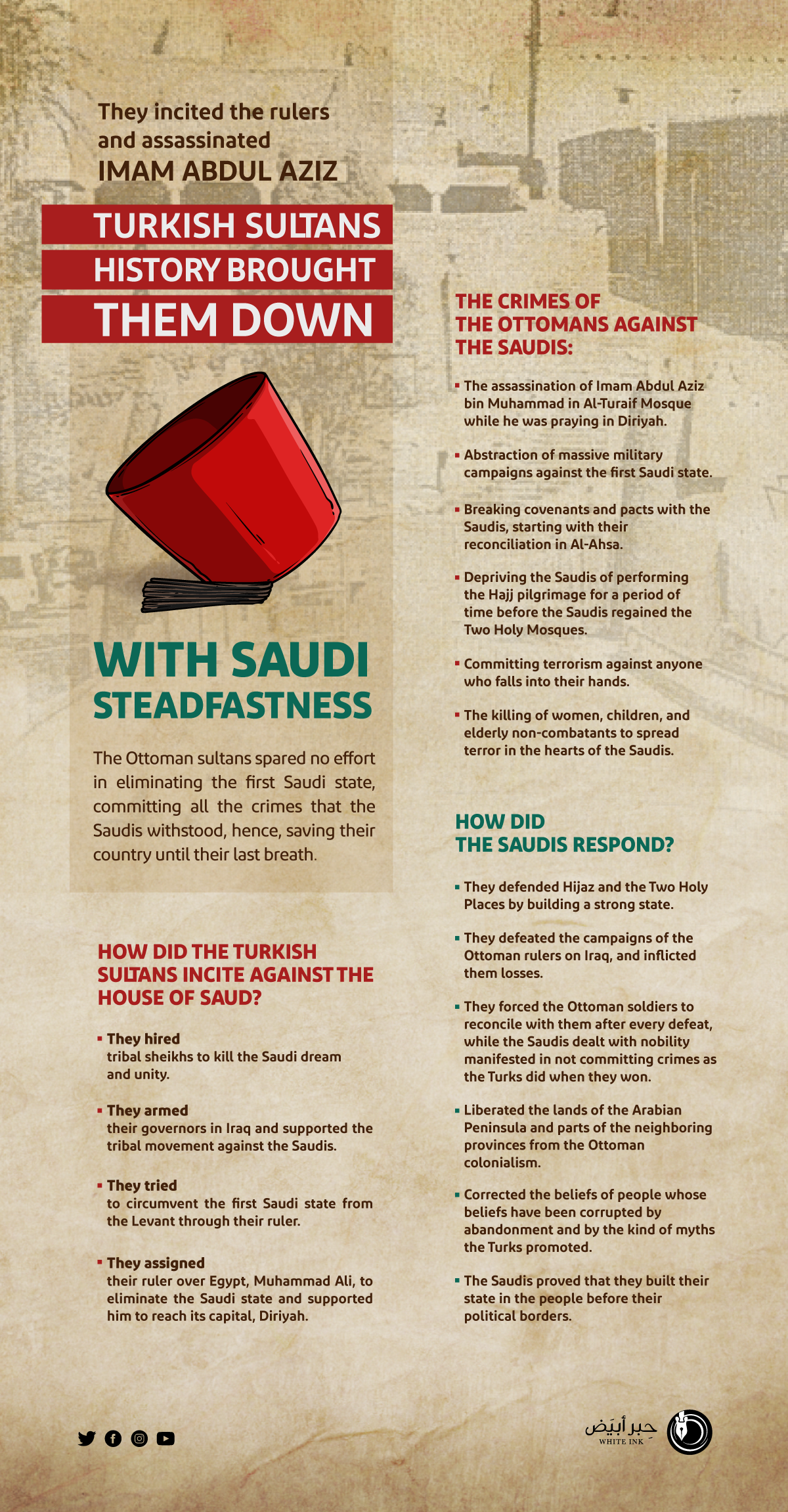

After they failed through their governors in Iraq
Repeating the victory of Saudi Arabia and the defeat of the Ottomans through their governors in the Levant
The nominal authority of the Ottoman Empire found that the establishment of the first Saudi state constituted an explicit threat to its colonial power to the Arab world in general and the Arabian Peninsula in particular, especially after the Saudis recovered the Two Holy Mosques from the Ottoman colonialist. This matter deprived them of the most important propaganda with which they justified their colonization of the region and tried to make of it a legitimate base that justifies their policies and violence against the Arabs, by promoting and consolidating the idea of the caliphate in them, while it is far from it, because they lack the two most important conditions for it, Arab lineage and Shura.
Historians agreed that the Saudis’ recovery of the Two Holy Mosques from Ottoman colonialism constituted a blow to the false symbolism of the Turkish Caliphate. The Ottomans considered this an affront to them and their position, with which they deceived the people through religious and historical promotion. One of the researchers confirmed the matter by saying: “They insulted the religious standing of the Ottoman Sultan by controlling the holy cities in the Hijaz. The loss of Mecca resulted in a severe blow to the reputation of the Ottoman Sultan and his religious standing as the protector of the Two Holy Mosques”. This is as they claim.
The new geostrategic reality prompted the Ottomans to resort to a hard approach by launching military campaigns aimed at eliminating the first Saudi state in its infancy, through a group of hubs, the most important of which were the Iraq and the Levant. It seems that the failure of the attacks from Iraq prompted the Ottomans to try to deceive the Saudi forces across the Levant, as they assigned their governors there to carry out campaigns against the Saudi armies and try to eliminate them.
The first signs of the clash of the first Saudi state with the Ottoman governors in the Levant were during one of the Hajj seasons, when Imam Saud bin Abdulaziz decided to prevent any manifestation of Ottoman sovereignty over the Two Holy Mosques. This is what prompted him to ask the Syrian prince of Hajj, Abdullah Pasha Al-Azm, not to come to perform the rites with bearings, drums, horns…etc.
This Saudi sovereign declaration was enough to explode the situation and confrontation between the two parties, had it not been for the fact that the governor of the Levant was in a weak field situation that did not enable him to confront the Saudis, who are more heavily armed than him. This is what made the Ottoman governor avoid confronting the Saudi armies and leave Mecca after three days without completing the rites of Hajj. This made him lose his position after the Ottoman Sultan, who felt extremely humiliated and embarrassed, dismissed him. What happened in Mecca was a great humiliation that hastened the dismissal of Abdullah Pasha Al-Azm and the appointment of King Yusuf Pasha, who was tasked with preparing military operations for the reoccupation of the areas recovered by the Saudis in the Arabian Peninsula.
The Ottoman governor, King Yusuf Pasha, maneuvered the Saudis to avoid a direct confrontation, trying to persuade the Ottomans to fulfill their desires.

The new Ottoman governor was aware of the danger of the Saudi armies and maneuvered to avoid direct confrontation. He only instigated the call of Sheikh Muhammad bin Abdul Wahhab, and focused on quick wars on the adjacent internal lines between the Levant and the Saudi state, by launching some limited campaigns, taking advantage of the imams’ preoccupation with other fronts. Imam Saud bin Abdulaziz sent a message to King Yusuf Pasha, explaining the origins of the belief and the correct approach to call, and at the same time, a veiled warning against any attack on the borders of the Saudi state.
Imam Saud’s letter to King Yusuf Pasha came with force, in addition to the speed movement of the Saudi armies, which reached the depth of the Levantine lands, and the Ottoman governor dealt with them with a weak reaction. For two years, he was unable to implement the goals he pledged to the Ottoman Sultan, which prompted the Sultan to isolate him and appoint Suleiman Pasha as governor of Damascus and Tripoli with the directives to coordinate with the governor of Egypt, Muhammad Ali Pasha, to eliminate the armies of the first Saudi state and to occupy the Two Holy Mosques again.
The Saudis were the cause of the internal confusion of the Ottoman Empire and the appointment of the governors of the colonized regions in the Arab world.

Despite the issuance of the royal firman appointing Suleiman Pasha, he faced fierce resistance from King Yusef Pasha, as the new governor could not enter Damascus until after strong confrontations with King Yusef. After that, he worked on gathering the population around him and managing the financial affairs of the state in light of the severe crisis that struck Damascus after the followers of King Yusuf Pasha looted the governor’s treasury.
With the appointment of Suleiman Pasha as governor of Damascus and Tripoli, and in light of the preoccupation of the first Saudi state with consolidating its pillars during that period, especially with their knowledge of the possibility of Muhammad Ali Pasha’s movement towards them, the confrontations on the Levant Front stopped, and the Saudis were satisfied with correspondence explaining the principles of the call.


- Othman bin Bishr, Title of Glory in the History of Najd, Investigated by: Abdul Rahman Al Sheikh, 4th Edition (Riyadh: Ministry of Education, 1971).
- Abdul Rahim Abdul Rahman, The First Saudi State, 5th Edition (Cairo: University Book Centre, 1987).
- Abdel Fattah Hassan Abu Aliya, Lectures on the History of the First Saudi State, 2nd Edition (Riyadh: Dar Al Marrekh, 1991).
- Osama Muhammad Abu Nahl, The Saudi threat to the Levant and its impact on Suleiman Pasha’s assumption of Damascus Province, Journal of Al-Azhar University in Gaza, Humanities Series, Volume 9, Issue.1 (2007).
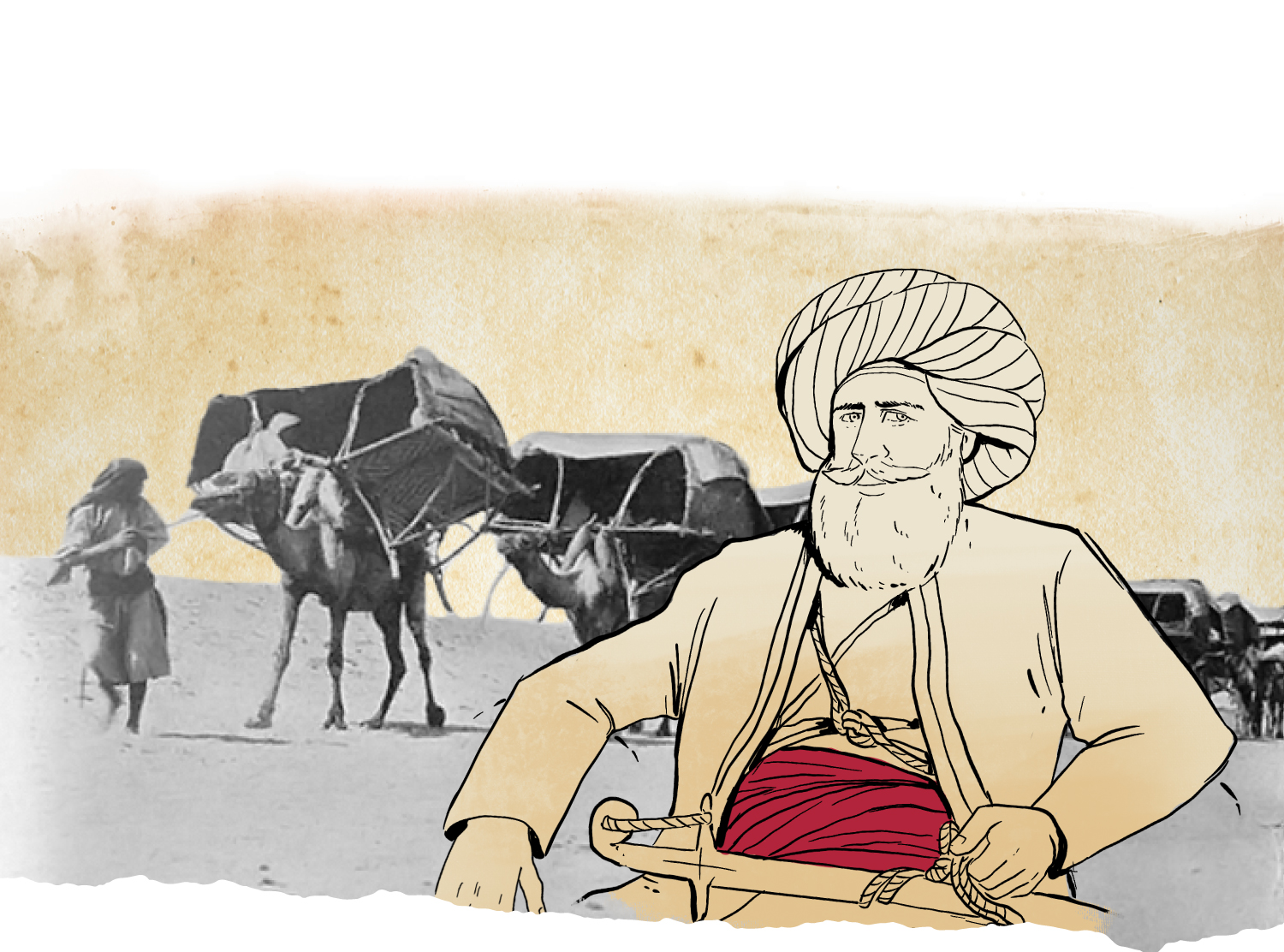
Having the Sultans believed in their governors’ failure in Iraq and the Levant
Why did Muhammad Ali respond to the Ottomans call, to overthrow the first Saudi state?
The expansion of the first Saudi state outside the borders of the Arabian Peninsula in the Arab world, was for spreading the reform for which it was established and in order to unite the people away from Turkish colonialism.
After the clash between the first Saudi state and the Ottoman Empire, especially with the governor of Baghdad; there was the great clash after the Saudis recovered Hijaz; This caused a backlash in Istanbul, especially with the disruption of the Syrian pilgrimage convoy, which is the main convoy as it starts from Istanbul and crosses Syria under the supervision and protection of the Ottoman governor of Damascus.
Researchers wonder about the inability of the governor of Damascus to confront the Saudis after they managed to recapture Hijaz, and to engage with them in a real confrontation in order to conduct the official pilgrimage that was under his leadership?
The English historian, Henry Dodwell, in his book “The political Union of Egypt in the era of Muhammad Ali, the Founder of Modern Egypt,” sheds some light on this important and exciting point about the inability of the Ottoman Empire through the governor of Damascus to address this matter, which it considered a real challenge to its position in the Islamic world; he refers to the failure of the governor of Damascus in this matter for a financial goal, as it is customary to allocate al-Miri’s money from lands in Damascus and Tripoli of the Levant to do what is necessary to send the Levantine pilgrimage to Makkah and spend on its protection, as well as the necessary supplies and provisions. Accordingly, the governor of Damascus was negligent in implementing his orders to conduct and protect the pilgrimage convoy, and to confront the Saudis. Dodwell believes that the governor of Damascus has coveted the money, and he thought that he could seize the money on the pretext that the caravan has been prevented from entering Hijaz.
Dodwell points out another significant issue, that no effort was made by the governor of Damascus to confront the Saudis, and this explains why he was dismissed by the Ottomans from the mandate of Damascus and the assignment of others.
What Dodwell referred to was not only a case of King Yusuf Pasha, as this applies to many Ottoman governors in the Arab world throughout history. The governors take the matter as a fiefdom to add to their wealth, by plundering the Arab wealth in the state in which they are appointed, and then the issue of the first Saudi state that worried the sultans of the Ottoman Empire was not of significant to the governors who see the affairs of state beyond their monies.
It was not limited to the governor of Damascus only; In another important phrase, Dodwell refers to the negligence of the Ottoman governors in confrontation of this matter despite its importance: ” For many years, the Sultan had issued orders to the governors of Damascus and Baghdad, which they did not pay attention to”; one of the most important orders that the governors slackened, was related to the issue of the first Saudi state, which the Ottomans believed that it had insulted them.
The Ottoman Sultan ordered the intervention of the governor of Egypt, Muhammad Ali Pasha, to address this matter; some believe that the Sultan went to Muhammad Ali as he was at the beginning of his tenure, and he could not refuse the Sultan’s orders. Another thing, which is hitting two birds with one stone, as Muhammad Ali’s confrontation with the Saudis will not only give the Sultan the opportunity to restore Hijaz, but also exhaust Muhammad Ali and squander his resources and eliminate the bulk of his soldiers in battles that he believes will be ferocious, from which the Sultan aspired after that to eliminate Muhammad Ali.
Certainly, the intentions of the Ottoman Sultan to make those whom he considers as his enemies to clash with each other, is unquestionable, just as Muhammad Ali could not but submit to the orders of the Sultan and prepare a campaign from his state led by his son Tosun; this campaign that faced problems from its beginning, and then led by the second son of Muhammad Ali Ibrahim Pasha.
The American researcher Fred Lawson tries to provide other explanations for Muhammad Ali’s acceptance of the Sultan’s orders and the preparation of a military campaign against the first Saudi state. He bases his analysis on an Egyptian local context, while not rejecting the Ottoman framework and the Sultan’s previously mentioned desires. Lawson believes that it must be taken into consideration that Muhammad Ali intended to accept the campaign not only to obey the orders of the Sultan, but also to deport some of his rioting soldiers against him to the Arabian Peninsula in a war that is expected to be excruciating, and the success of Muhammad Ali would make him famous among the Ottomans.
The Ottomans targeted Muhammad Ali by having him in stand-off with the Saudis to exhaust both parties, and devote themselves to whoever lasts.

Lawson not only provided these explanations, but also an economic analysis, according to some historians; as he believes that Muhammad Ali’s acceptance of sending the campaign to the Arabian Peninsula was also for economic reasons, which is to restore commercial activity across the Red Sea, an activity that is of great importance to the economy in his state, and the transit trade between East and West, which Egypt was the most important station, and the Saudis’ recovery of Hijaz means weakening trade in his state and its economic interests.
There were multiple reasons behind the request of the Ottoman Sultan from his governor of Egypt, Muhammad Ali, to send a campaign to eliminate the Saudi state, foremost of which is the desire of the Ottoman Sultan, and to preserve his position that the Saudis have shaken in the Islamic world, given the importance of Hajj convoys, not to forget the negligence of the governor of Baghdad and the governor of Damascus in confronting the Saudis, in addition to the Ottoman Sultan’s desire to dissipate Muhammad Ali’s forces in a fierce war, due to his fear of him. We cannot separate the local Egyptian factors from Muhammad Ali’s desire to get rid of some of his troubled soldiers by sending them in a war away from Egypt, but the economic dimension is no less important than the previous reasons, which is Muhammad Ali’s desire to assert Egypt’s control over the international trade route of the Red Sea.
The Ottoman governor in Egypt moved against the Saudi state for economic reasons and to extend his influence in the Arabian Peninsula.



- Henry Dodwell: The political Union of Egypt in the era of Muhammad Ali: the founder of modern Egypt, translated by: Ahmed Abdel-Khaleq and Ali Shukri (Al-Qaher: National Translation Center, 2007).
- Fred Lawson: Social policy expansionist assets of Egypt in the era of Muhammad Ali, translated by: Anan El-Shahawi (Cairo: National Translation Center, 2005).
- Muhammad Alsorbone, Egyptian empire in the era of Muhammad Ali and the eastern part of the first issue, translated by: Nagy Attia (Cairo: National Translation Center, 2015).
- Al-Sayed Farag, Wars of Muhammad Ali (Cairo: Al-Tawakkal typing center, without date).


